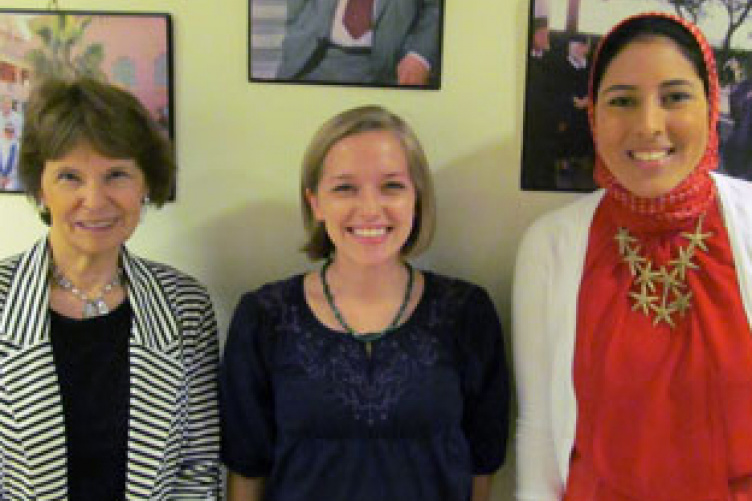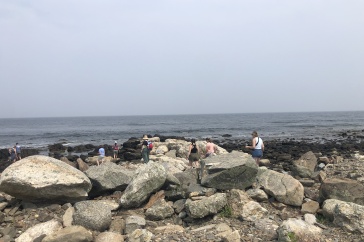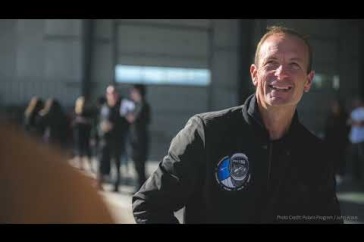
Lawrence with her Egyptian mentor Barbara Ibrahim (left) and a project interviewee Sherine Taraboulsi
Research Puts Student “In the Moment”
|
Hannah Lawrence '13: "Everybody wanted to tell you their side of the story." |
When Hannah Lawrence ’13 arrived in Cairo this past June, supporters of democracy were still filling Tahrir Square and citizens faced a second round of voting to elect a new president.
Lawrence, however, had traveled to Egypt to study an issue much less visible to Americans than the ongoing protests or political uncertainty: the status of women after the fall of longtime dictator Hosni Mubarak. Her project, titled “Women’s Rights in a Post-Mubarak Reality,” examined how women have fared politically and economically since the 2011 revolution.
An International Research Opportunities Program grant from the Hamel Center for Undergraduate Research allowed Lawrence to spend nine and a half weeks in Cairo, giving her an up-close view of a situation that was constantly changing. “It was really moving and inspiring from the moment I got off the plane,” she says. “I was fortunate to be there when people were openly talking about politics and the revolution. Everybody wanted to tell you their side of the story, their take on the revolution and how it’s shaping everything else. It was really special to hear those firsthand accounts.”
Lawrence, who’s majoring in political science and justice studies (with minors in women’s studies and middle eastern studies), became interested in her topic after receiving Amnesty International updates last year on women protestors who said they were forced to undergo virginity tests following their detention in Tahrir Square. She also wanted to complement her qualitative research by continuing her study of the Arabic language, begun two years earlier.
Working with Associate Professor of Political Science Jeannie Sowers, she began conducting research on the position of women in Egypt since 1922, when the country became independent from Britain. Her preparation took her beyond the library, to news sources such as Egypt Independent, the English-language edition of Egypt’s major independent daily newspaper, Al-Masry Al-Youm. “Every day there was something new,” she says. “Mine was a project happening in the moment.”
In Cairo, she interviewed 12 women, most of them employed by universities and nonprofits. Their accounts provided a complicated picture of the current state of women’s rights in Egypt. Lawrence learned that Suzanne Mubarak, Hosni Mubarak’s wife, had backed laws benefitting women, including Parliamentary quotas and divorce rights. However, “those laws have become branded as Suzanne’s laws,” observes Lawrence. “They have western feminist connotations that have harmed the women’s rights movement. They’re seen as part of the old regime.”
Last year, the country’s military rulers jettisoned the quota for women in Parliament. Without a quota system, and with the names of female candidates often placed low on party lists, only eight women were elected to the 508-member legislative body. This year, Parliament members unsuccessfully tried to rescind the right to a divorce for women and to lower the minimum age of marriage for girls to fourteen.
“A lot of women were feeling like they can’t even work toward gaining further economic and political rights because they’re having to fight for the rights they’ve already achieved,” Lawrence says.
Another challenge is an overall lack of coordination among the various groups advocating for women’s rights in the new Constitution. “That’s what a lot of women I talked to said was hurting them. They do not have a united front to express their demands.”
Still, there was optimism and excitement among women in Egypt. Lawrence was the only Westerner at a press conference on a paper calling for equal rights and freedoms for women. Prepared by the Egyptian Feminist Union and the Alliance for Arab Women, the document was presented to the committee charged with writing Egypt’s new constitution.
In addition to her research, Lawrence spent about 20 hours a week in an intensive language course at the American University in Cairo, studying both Modern Standard Arabic and the Egyptian dialect. Whether practicing how to direct a taxi or order food at a restaurant, “You could actually apply lessons that afternoon, so it was really helpful being immersed in the language.”
Lawrence plans to enter a master’s program to continue her study of Arabic and human rights. Meanwhile, as protests against an anti-Muslim film have flared in Egypt and throughout the world in recent days, her experience last summer has led her to seek perspectives from as many sources as possible, including Sowers and her Arabic teacher. Says Lawrence, “I’m trying to get a well-rounded view.”
Each year in October, the Hamel Center for Undergraduate Research marks the academic homecoming of IROP students with the IROP SYMPOSIUM, brief illustrated research presentations crafted for a general audience of faculty, students, administrators, supporters, families, and invited guests. The special anniversary edition of the International Research Symposium will be held during Homecoming on Friday, October 12, from 2-5 p.m. in MUB Theatres 1 and 2.
Originally published by:
UNH Today
Written by Sonia Scherr ’13MFA. Photos courtesy Hannah Lawrence.

















































